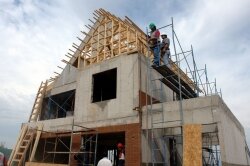Big three: What are assessments, appraisals, and market value?
With all the information about today’s housing market, it’s easy for buyers, sellers, and observers of real estate activity to be confused about the difference between an assessment and an appraisal and the relationship of each to market value.
Assessments are used by the local government to establish tax payments and generate revenue. Assessors verify area sales data and group similar properties for purposes of comparison. Though market data is used during this process, tax value, which is a fixed figure, doesn’t necessarily reflect market value, which fluctuates with interest rates, inventory, demographics, government incentives, and the overall economy.
Assessments offer a snapshot of value as of January 1 of each assessment period; assessors depend on the filing of building permits to update their records after this date. So if a homeowner undertakes an extensive remodeling project in February without filing the necessary permits, the increase in value won’t be reflected until the next assessment.
There’s a close correlation between tax rate and assessment since these levies help fill municipal coffers, and values sometimes have to be adjusted in order for revenues to remain consistent from one year to the next. Both Charlottesville City and Albemarle County assess on a yearly basis, and if assessments decline by, let’s say three percent, the tax rate may have to be increased by three percent to maintain the tax base, depending on the status of other revenue streams. Because assessments don’t equate to market value, realtors must use caution when factoring them into their listing prices.
An appraisal is conducted by a certified independent professional who visits a property and compares it to similar houses in the area. By examining recent sales and current listings, the appraiser comes up with an estimate of the property’s value, though he or she often lacks either familiarity with or access to the comparison parcels, a factor that can affect the accuracy of the findings.
Appraisals are required by lending institutions to ensure that the value of the house being purchased isn’t lower than the amount of the loan they’re approving. With today’s uncertain market conditions, establishing the values needed to secure financing is increasingly difficult, especially since many lenders now deal only with a list of approved vendors. Appraisers from outside the Charlottesville-Albemarle area are limited by a couple of key factors, a situation that has some realtors worried.
“I’ve definitely seen a rise in the number of out-of-area appraisers,” says Amy Webb of Nest Realty. “This causes concern on two fronts. One, our market is unique, and out-of-area appraisers might not be familiar with it. And two, how are they getting their data? How many of them have the network required to get the background they need?”
Finally, market value is determined by supply and demand. As inventory increases, prices decrease– a situation we’re all too familiar with given current conditions. While an appraisal is often a closer reflection of market value than an assessment, neither is foolproof. A comparative market analysis (CMA) can often offer a more precise range of value. Most realtors provide CMAs so their sellers have a reasonable expectation of selling price, though it’s important to note that this expectation can change markedly over time. What seems reasonable when a house is introduced to the market may not be so reasonable six months down the road.
Ulitmately, market value is determined by what a buyer is willing pay for a particular property on a particular day. And in today’s economy, that figure is more often than not a moving target.

4 comments
You hit the nail on the head when you said that Market Value is "what a buyer is willing pay for a particular property on a particular day". This is what most buyers in this market understand and what many (dare I say most) sellers do not comprehend.
Code of Virginia says real property shall be assessed at fair market value, so assessments should be reasonably close to qualified selling prices given an allowance for the time lag involved. When a property sells for a lot more than the assessment, things need a closer look. And when the assessment is not appropriately adjusted after a sale, someone needs to start asking questions.
There is insufficient oversight of the assessment process in Virginia compared to other states. Not a lot of enforcement on a lot of things by Richmond. That's why reporters like you who have a understanding of the process need to step up and do some digging to keep things equitable and uniform, just like the law says it should be.
In Jan 2010 the assessed values of all* homes sold in Charlottesville was 12% below assessments, Feb was 12%+ below Assessments. March was 6.5% less. I have not figured the other months. I would bet though that once again next year the assessments will be flat and not go down much in the City. All* is not counting new builds, trust to trust sales, habitat for humanity sales
And here I had been thinking that an appraisal was a fraudulent statement of false value, made by a tool who was in the pocket of the banks and realtors, the purpose being to line everyone else up to pay $450K for a house that couldn't rent for more than $1200-1300....shees, my bad...